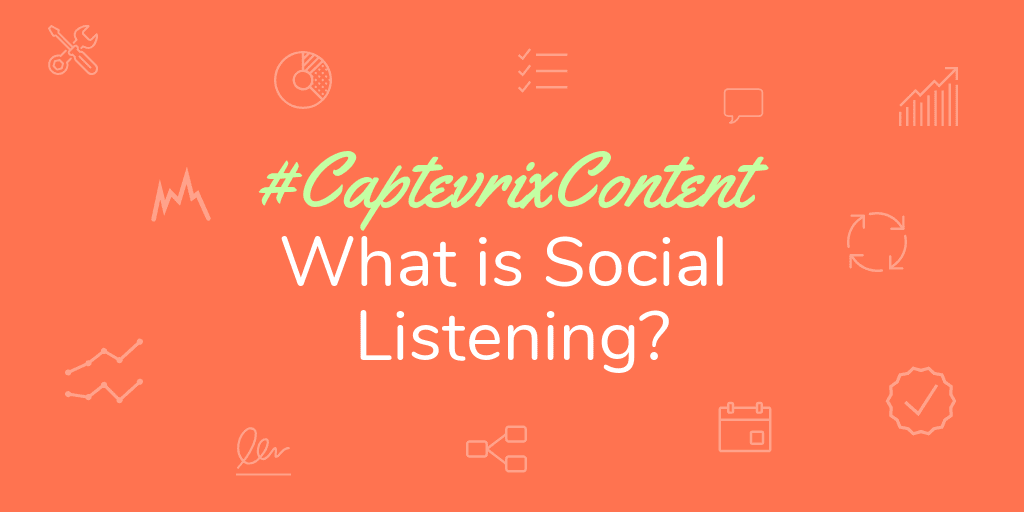Are you listening to your audience?
Are you hearing your audience – or are you listening to them? While the two terms may seem interchangeable, there is a key difference that can set your company or brand apart. Hearing is receiving and understanding data. Listening, however, is hearing, understanding and then applying that data.
Using social listening for your business is an important part of inbound marketing and a vital tool in your demand generation. It will help your business on multiple fronts. It will help you utilize social media to find and engage with your target audience, understand your competition better, and keep you up-to-date on industry developments. In this article, we’ll look at what social listening is, why it’s important, and how to best use it for your business needs.
Social Listening – what is it?
The short answer is that social listening is applied social data. This is done by casting a wider net, so to speak, on social media data. It is using tools (which we will share later in this article) to get information beyond just direct page hits to your websites and specific mentions of your company. Social listening is also taking the social media marketing data your company collects – number of mentions, page views, web traffic origins, etc. – and knowing where it fits in the larger conversation of your industry and society. It is also learning to cast a wider net and gather data not just about your company, but also about your industry. There are tools and tips we’ll share below that will help you learn to gather the big picture of data and better understand the conversations happening in a broader sense.
Why is it important?
One of the most important benefits to social listening is that it helps you find the conversations about your company and industry that are happening organically. This means you’ll be able to interact with audiences that are already engaged and interested in your topic. It will help you not only reach and strengthen your relationship with existing clients – but it’ll help you find new clients as well. Social listening also helps you better understand your industry in general.
By broadening your scope, you’ll be able to understand where your company fits in with your competitors and industry standards. It’ll help you remain relevant and engaged. By using this technique, it will help you learn what your audience wants. You’ll get an inside look into what your competitors are doing right – and what they’re doing wrong. Social listening allows you to learn from the leaders in your industry and use those insights to make your product and company better.
By using social listening effectively, you can be a part of the bigger picture. When you’re listening and understanding the overall conversation – instead of simply focusing how many retweets your company’s Twitter account has, for example – you can learn how and where your company can improve in a broader sense. Maybe you’ll learn a simple development to your product that would make it easier to use. Maybe you’ll discover a niche market that’s perfect for your company. You’ll never know unless you listen.
Key Strategies to Use for Social Listening – Successfully
Now that you know how important social listening is, how do you use it? As we mentioned before, the basic idea with social listening is to cast a wider net than you would have with social data analytics. There are some tools you can use to help you understand and keep track of the conversation surrounding your industry and brand in various social media platforms.
Here are the top tips and tools we recommend using for social listening to your advantage:
1. Set up Google alerts
Set up Google alerts for several different phrases, including your company’s name, competitors’ names, and key terms surrounding your industry. Be sure to include common misspellings, abbreviations, and related terms and phrases.
2. Social Report
Social Report is a website that sets up searches across multiple social media platforms and searches for keywords and phrases that you select. It pulls a report from the search agent you’ve created from keywords and phrases. A report is then generated and sent to you.
3. Twitter advanced search
While using a single search engine for social media monitoring (such as Social Report) is good, using individual websites’ search engines can also be a good way to monitor conversations surrounding your brand or company. This is especially true if you are looking for something more specific. Twitter’s advanced search option can help you narrow down your search and find where the conversations are happening.
Social listening is a vital way for you to use your social media data to be a part of the human conversation that is surrounding your industry. When you can learn to effectively listen and engage in relevant topics, you can better connect with your audience. You can enter an organic, ongoing conversation that is already happening in order to make your company better.















